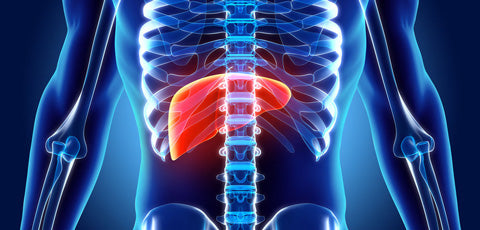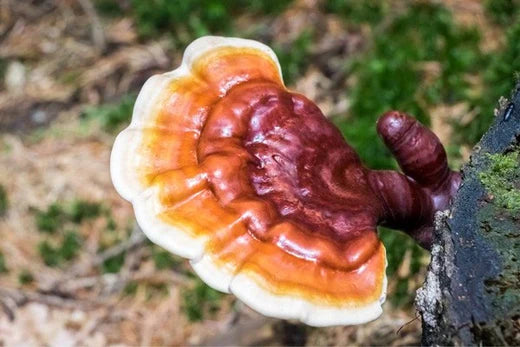12 Best Herbs for Liver Detoxification

The liver is truly an amazing organ that plays a crucial role in maintaining overall health and wellbeing. Did you know that every minute, the liver filters an astonishing 1.3-1.5 litres of blood? It's responsible for nutrient metabolism, storage of key vitamins and minerals, the breakdown of old blood cells, and so much more.
One of the liver's most important functions is detoxification, which is why it's important to support it through a healthy diet and lifestyle. The liver is responsible for transforming and eliminating both endogenous and exogenous toxins, which can cause a range of health issues when not properly eliminated.
Luckily, there are natural herbs that can help support the liver's detoxification process and promote liver health. By incorporating these herbs into your daily routine, you can help alleviate symptoms such as hormonal imbalances, digestive issues, chronic fatigue, and more.
So, what are the best herbs for liver repair? Keep reading to find out! By taking care of your liver, you're taking a crucial step toward achieving optimal health and wellbeing.
Table of Contents
-
Liver Detox in Two Phases
-
12 Effective Herbs to Deal With Unhealthy Liver
-
1. Reishi Mushroom
-
2. Astragalus Root
-
3. Dandelion
-
4. Cordyceps Mushroom
-
5. Turmeric
-
6. Schizandra Berry
-
7. Ginger
-
8. Selenium
-
9. Milk Thistle
-
10. Cardamom
-
11. Artichoke
-
12. Chicory Root
-
Frequently Asked Questions About Liver Detox Herbs
-
Conclusion
-
References
Liver Detox in Two Phases
Did you know that the liver is responsible for detoxifying our body? It performs this crucial function through two key phases of liver detoxification, namely phase 1 and phase 2.
In phase 1, the liver transforms fat-soluble compounds into water-soluble compounds by using a family of enzymes called Cytochrome P450. This transformation includes compounds such as caffeine, OTC drugs, ibuprofen, histamines, hormones, tobacco, and insecticides.
Phase 2 involves six conjugation pathways, namely Glucuronidation, Glutathionylation, Sulfation, Methylation, Glycination, and Acetylation. These pathways convert toxic substances like organophosphates, pesticides, alcohol, toxic metals, penicillin, sex and stress hormones into different compounds, which are then eliminated by our body's key emunctory organs such as the lungs, skin, kidneys, and large intestine.
Not only does the liver perform this impressive function, but it's also the only organ in our body that can regenerate itself, making it even more remarkable.
When our liver is not functioning properly, it can be indicated through high levels of liver enzymes such as AST, ALT, alkaline phosphatase, lactate dehydrogenase, total bilirubin, and total plasma total protein. Another concept to be aware of is oxidative stress, which is the accumulation of reactive oxygen species (ROS') that damage our cells and DNA, leading to inflammation and chronic disease states.
To combat oxidative stress, our body produces master antioxidants like Glutathione and superoxide dismutase (SOD). When we consume antioxidant-rich foods, it increases the body's production of these two antioxidants, which helps balance anti-inflammatory and pro-inflammatory compounds.
To support our liver's health and aid in detoxification, we can use the best herbs such as milk thistle, dandelion, turmeric, and artichoke. These herbs can help improve liver enzyme levels and reduce oxidative stress, thereby supporting our liver's vital role in maintaining our overall health.

12 Effective Herbs to Deal With Unhealthy Liver
Liver health issues are not necessarily linked to any specific symptoms or diseases, but a liver that is overworked or burdened can result in various symptoms such as high blood pressure and cholesterol, digestive problems, hormone imbalances, disrupted sleep, fatigue, and anxiety. Specific conditions such as non-alcoholic fatty liver disease (NAFLD), gallstones, cirrhosis, insulin resistance, and type 2 diabetes may also occur.
To better understand the liver's function, it can be likened to a bucket with tiny holes at the bottom that represent its detoxification output. Oxidative stress is a significant cause of liver damage, and an overburdened liver can result in physical symptoms.
Each toxin we are exposed to represents a rock in the bucket, and as we go through life, more rocks are added, including alcohol, drugs, pharmaceuticals, pesticides, and caffeine. Therefore, it is crucial to work on detoxing the liver to reduce oxidative stress and restore healthy liver function. The best way to achieve this is to consume herbs for liver health, as the 12 recommended below, which can grind down the burdensome rocks and improve liver function.

1. Reishi Mushroom
The Reishi Mushroom, also known as Ganoderma lucidum, is recognized as the "Supreme Protector" due to its anti-stress and calming effects on an overactive stress response. It has been traditionally used in Chinese medicine for thousands of years to promote healthy liver function and overall wellbeing.
To detoxify the liver properly, the body needs to be in a state of rest and digestion, known as the Parasympathetic Nervous System state, as stress inhibits proper detoxification. Reishi Mushroom supports the adrenals, HPA axis, and buffers emotional, physical, and environmental stress responses while decreasing our allostatic load, which protects us from external pollutants and toxins that burden the liver.
Moreover, Reishi Mushroom increases glutathione production, which is a master antioxidant that scavenges free radicals that are produced as a by-product of normal cell functioning. It can recycle glutathione and protect the liver from exogenous and pharmaceutical damage, as seen in a 2013 study demonstrating its preventative effect on acute hepatotoxicity in mouse studies.
Reishi Mushroom, Astragalus, and Black Soybean have been shown to lower lipid peroxidation and increase glutathione peroxidase and glutathione S-transferase, reducing hepatocyte damage. Although human studies are limited, research on liver damage and elevated liver enzymes in rats suggests that Reishi Mushroom supports liver detoxification and normal liver enzyme levels by protecting against toxic exposure and supporting hepatocyte function. Consistently supporting the liver's crucial role is essential, and Reishi Mushroom is superior in supporting liver function and protecting against additional toxic exposure.

2. Astragalus Root
Astragalus root, also known as Astragalus Membranaceus, is another highly revered Chinese tonic herb that has been used for thousands of years to support and stimulate healthy liver and immune function. Like Reishi Mushroom, it is a supreme adaptogen that builds resilience to toxin exposure by decreasing inflammatory effects and cascades of a mounted response. Astragalus root also boosts antioxidants and protects against oxidative stress, making it effective in protecting against liver injury and oxidative stress-related conditions.
As a hepatoprotective herb, it protects liver cells from free radical damage and exposure to environmental toxins, particularly carcinogenic agents such as carbon tetrachloride.
In a 2016 study, a mixture of Myristica fragrans, Astragalus membranaceus, and Poria cocos was shown to be effective in reducing alcohol-induced acute liver toxicity. The study demonstrated a decrease in liver enzymes and an increase in SOD, demonstrating the effectiveness of Astragalus root in supporting liver detoxification and reducing damage. Another 2009 study showed the synergistic hepatoprotective effects of Schisandra berry and Astragalus root on chronic liver injury in rats, resulting in decreased elevated liver enzymes and increased glutathione and SOD.
These findings suggest the potential short-term and long-term benefits of Astragalus root in supporting liver detoxification and overall liver health.

3. Dandelion
Dandelion root, also known as Taraxacum officinalis, is a foundational herb in Western herbalism that promotes healthy liver function and detoxification. It is one of the best herbs for liver repair due to its many benefits. Dandelion root is a bitter herb and cholagogue, hepatoprotective tonic, and gentle phase 1 liver detoxifier. It stimulates bile release and gall bladder contraction, and functions as a gentle diuretic.
Cholagogues, such as dandelion root, stimulate the release of bile from the gall bladder. Bile mops up toxins and excretes them through the large intestine. The liver synthesizes bile, and the gall bladder stores it. Hepatics are a classification of herbs that tonify and support liver health, making dandelion root an excellent choice.
Phase 1 detoxification is all about transforming fat-soluble compounds into water-soluble ones. Dandelion root supports liver detoxification by specifically aiding the transformation of caffeine, OTC drugs, ibuprofen, histamines, hormones, tobacco, and insecticides.
Dandelion root also functions as a gentle diuretic, which is essential for those experiencing fluid retention, key symptoms of a sluggish liver, kidney, and lymphatic system. Dandelion root helps to cleanse and get things moving, preventing congestion and waste build-up, which can further burden liver health.
In addition to its medicinal benefits, dandelion root can also be used as a caffeine replacement. It has a bitter component that can serve as a coffee alternative (which also requires metabolism from the liver) for those with a sluggish liver. Traditionally used as a morning beverage, dandelion root is a great option for those seeking a healthy alternative to coffee.

4. Cordyceps Mushroom
Cordyceps mushroom, also known as Cordyceps Sinensis, is an effective liver-loving alternative to coffee that binds to the same receptors without the adrenal and nervous-system stimulating effect that caffeine elicits. It can decrease additional burdens to the liver's detoxification pathway while supporting its function.
Numerous studies have shown that Cordyceps mushroom increases glutathione peroxidase and superoxide dismutase while decreasing lipid peroxidation and pro-inflammatory compounds that drive cellular aging. It also functions as an antioxidant that scavenges free radicals and has been shown to decrease elevated liver enzymes. Cordyceps is an adaptogen that modulates the stress response and lowers oxidative stress, like Reishi and Astragalus.
Cordyceps mushroom is also protective against hepatotoxicity by activating NrF2 pathways, a key anti-inflammatory pathway, thanks to its unique polysaccharide compounds. It balances sex hormone levels, adding a preventative dimension to liver detoxification by decreasing and balancing estrogen within the body.
With its adaptogenic properties, Cordyceps mushroom also has anti-viral and immunomodulating components. Viruses and bacteria release endotoxins that contribute to the burdening of the liver and oxidative stress within the body. Cordyceps mushroom works to decrease overall exposure to toxins, support endogenous antioxidant synthesis, and decrease pro-inflammatory markers. Overall, Cordyceps mushroom is a valuable addition to any liver detoxification regimen.

5. Turmeric
Turmeric root, also known as Curcuma longa, is one of the most potent Ayurvedic herbs that has been used in India for centuries. Turmeric is known for its powerful anti-inflammatory properties and is revered for its ability to treat and prevent numerous inflammation-based diseases.
When it comes to liver detoxification, Turmeric is another herb that supports both phase 1 and phase 2 detoxification pathways. It is hepatoprotective and helps protect and detoxify liver cells (hepatocytes) from damage when exposed to reactive species as they transform from lipid-soluble to water-soluble.
This plays into the potent antioxidant effects of Turmeric root by donating itself to cancel out the free radical species that drive cellular damage and accelerate disease and aging of the liver. A study on mice demonstrated the effectiveness of Turmeric root in protecting and improving liver detoxification by lowering inflammatory markers and mediators, reducing oxidative stress, and increasing endogenous glutathione peroxidase and superoxide dismutase (SOD) in the blood.
Turmeric helps balance the see-saw effect that is phase 1 and phase 2 liver detoxification. When phase 1 detoxification is too fast and phase 2 can't keep up, there is an increase and accumulation of toxic intermediates that damage liver cells and cause inflammation. Turmeric is both a phase 1 and phase 2 liver health herb balances the detoxification processes and further protects the liver cells.
Turmeric is well known for shielding the liver from oxidative stress, suppressing proinflammatory cytokines, increasing and inducing the Nrf2 pathway, and increasing SOD, GSH, and GPx (glutathione peroxidase, the enzyme that recycles glutathione so we can keep using it). Turmeric is a valuable addition to any liver detoxification regimen and should be consumed regularly for optimal liver health.

6. Schizandra Berry
Schisandra berry, also known as Schisandra Chinensis, is a highly revered tonic herb in Traditional Chinese Medicine (TCM) that has a unique ability to support the regeneration of healthy liver cells, making it a hepatic Trophorestorative. This unique trait makes Schisandra berry a profound and superior adaptogen and liver-supportive herb.
Lignans are the key bioactive compounds in Schisandra berry that protect liver cells from dying and increase membrane stability. In specific rat studies, Schisandra was shown to induce the regeneration of liver tissue after part of the liver was surgically removed, indicating how powerful this herb is in literally regrowing and supporting the regeneration of liver health.
Schisandra induces phase 1 detoxification, meaning when consumed regularly, it activates liver detoxification pathways and helps to decrease lipid peroxidation, a key free radical pathway that destabilizes and disrupts the function of our cell membranes.
As an adaptogen, Schisandra increases our resilience to a vast array of physical, chemical, and emotional stressors. In TCM theory, Schisandra contains all five flavors, enters all 12 meridians, and nourishes the detoxification organs, kidneys, lungs, and spleen.
Human studies have demonstrated Schisandra may help treat patients with hepatitis and chronic liver disease, but it's also exciting for the potential of Schisandra to be used as a preventative medicine to support healthy liver function. Schisandra berry is a valuable addition to any liver detoxification regimen and should be consumed regularly for optimal liver health.

7. Ginger
Ginger (Zingiber officinale) is a versatile herb that is not only used to enhance digestion and boost immunity, but it also plays a vital role in liver detoxification. Ginger is a potent Nrf2 activator that enables the expression of key detoxifying and antioxidant compounds, thereby decreasing oxidative stress and giving Ginger its hepatoprotective qualities.
One of the essential functions of Ginger in liver detoxification is its ability to protect the liver and support it in eliminating harmful xenobiotic agents like alcohol, heavy metals, and endocrine-disrupting compounds that we encounter through personal products.
Ginger also helps prevent additional toxic exposure and build-up from viral and bacterial assaults, which reduces the burden on the liver. Furthermore, its warming property enhances the delivery of nutrients to liver cells and helps improve their ability to perform their functions optimally.
In mice studies, Ginger was shown to induce GST and Nrf2 transcription factors and neutralize lipid peroxidation in hepatocytes. Ginger is also a potent antioxidant and free radical scavenger, enhancing SOD and GPx, and supports both phases of liver detoxification.
Additionally, Ginger plays a crucial role in supporting healthy circulation and a strong immune system, which helps to prevent viral toxic by-products from contaminating our systems. By supporting a healthy lymph system and improving immune function, Ginger assists in the removal of toxins from our bodies. So, Ginger is not just a tasty spice that adds flavor to our dishes, but it is also an essential herb that can help support our liver health and detoxification processes.

8. Selenium
Let's talk about the important trace mineral, Selenium, which plays a crucial role in liver detoxification. The liver requires Selenium to make glutathione and glutathione peroxidase (GPx), an enzyme that recycles and renews glutathione. Without sufficient selenium, our body's ability to detoxify and eliminate toxins from the liver's phase 2 detoxification process is inhibited, leading to a buildup of harmful substances.
Selenium is also a powerful antioxidant mineral that helps protect the liver from oxidative damage. It can neutralize and prevent harmful substances such as Aflatoxin B1, a toxic mycotoxin present in foods like peanuts, corn, cotton, and grains imported from countries without strict testing and regulations. That's why it's important to buy locally sourced and organic foods whenever possible to avoid additional burdens on your liver.
Did you know that you can obtain your daily recommended intake of Selenium by consuming just two to three Brazil nuts per day? So, make sure to include this mineral-rich nut in your diet to support healthy liver function and detoxification.

9. Milk Thistle
Milk Thistle (Silybum marianum) has long been known as one of the most effective herbs for liver detoxification. This powerful herb supports both phase 1 and phase 2 detoxification pathways in the liver. Additionally, Milk Thistle acts as a hepatoprotective, cholagogue, hepatic, anti-inflammatory, and cholesterol-lowering herb.
One of the primary benefits of Milk Thistle is its potent antioxidant properties. It prevents free radical damage and inhibits the depletion of glutathione in the liver from alcohol and other toxic metabolites. In fact, it has been shown to increase basal glutathione levels in the liver by 35%, which demonstrates its ability to upregulate the defense mechanisms of the liver.
Milk Thistle also stimulates protein synthesis within the liver, which is essential for the growth of new liver cells. By replacing old liver cells with new ones, Milk Thistle can help to regenerate liver health. It works particularly well in combination with Schisandra berry to support healthy liver regeneration.
Another unique benefit of Milk Thistle is its ability to prevent toxins from binding to cell membrane receptors, which can damage cell function and organelles. This decreases unnecessary cell death and protects the liver from damage. Milk Thistle also inhibits leukotriene enzymes and prostaglandin, reducing inflammation and enhancing phase 2 liver enzymes responsible for detoxifying a range of substances, including pesticides, paracetamol, toxic heavy metals, penicillin, alcohol, petroleum distillates, and tetracycline.

10. Cardamom
Cardamom is not just a delicious spice used in Asian and Indian cuisine, it's also a potent antioxidant that can do wonders for your liver health. It has a high ORAC (Oxygen Radical Absorbance Capacity) value, which means it can reduce liver damage caused by oxidative stress. Moreover, cardamom has been shown to decrease the production of cytokines, TNFa and IL6, which are pro-inflammatory cytokines that can signal degradation within the body.
Cardamom can also increase glutathione levels, which is crucial for liver detoxification. Additionally, it's a COX2 inhibitor, meaning it can help reduce inflammation in the body. As we know, inflammation is at the root of many chronic symptoms and diseases, so incorporating cardamom into your diet can help prevent and alleviate these issues. So, not only does cardamom add delicious flavor to your meals, but it also has amazing health benefits for your liver and overall well-being.

11. Artichoke
Artichoke, also known as globe artichoke (Cynara cardunculus, variety scolymus), is a remarkable herb that works in tandem with the liver and gallbladder to promote healthy bile concentration and support the entire hepatobiliary system.
As we know, bile plays a crucial role in the emulsification and absorption of dietary lipids and fat-soluble vitamins such as Vitamin A, D, E, and K. By supporting the liver's detoxification pathways, we must also consider the gallbladder's role in waste removal. When the gallbladder isn't functioning optimally, our ability to excrete toxins that the liver has transformed and metabolized is decreased.
This phase of detoxification is known as "Phase 3", in which toxins and metabolites are excreted from the body via the intestinal tract. That's why we shouldn't ignore the urge to go when nature calls. It is essential to avoid reabsorbing toxins or allowing them to accumulate in our bowels.
In addition to being the primary elimination vehicle for cholesterol and other lipid-soluble compounds such as hormones and pheromones, bile also assists in the elimination of heavy metals, mycotoxins, and bacterial toxins. Research has revealed that the same transporters that carry bile acids in and out of the intestines also transport such toxins, indicating that the movement of bile is critical in their elimination.
Artichoke has been found to improve bile concentration, thereby enhancing the body's ability to eliminate toxins. Additionally, it reduces the burden of cholesterol on the liver, which is known to drive metabolic diseases.
So, incorporating artichoke into your diet can promote healthy liver and gallbladder function, improve bile flow, and help eliminate toxins from your body.

12. Chicory Root
Chicory root (Cichorium intybus) has been used for centuries as a liver-cleansing herb, dating back to the Ancient Egyptians and Romans. This bitter herb, like Dandelion and Artichoke, increases bile production and flow.
Inulin, a prebiotic fiber found in Chicory, nourishes and feeds intestinal bacteria, which play a critical role in detoxification. The large intestine is a key piece of the detoxification puzzle, as many toxins are excreted through the microbiome. A healthy microbiome enables the healthy excretion of toxins and the absorption of nutrients to fuel the hepatocytes.
Chicory root also works on phase 1 CYP enzymes, specifically CYP1A2 and CYP2. Traditionally, Chicory root is used alongside Dandelion root as a caffeine replacement beverage to decrease stress on the liver health since caffeine can overburden the liver as it’s metabolized through it.
Chicory is also rich in polyphenols, which provide antioxidant effects, supporting the liver and reducing oxidative stress.
Frequently Asked Questions About Liver Detox Herbs
What herbs detox the liver?
Reishi mushroom, Astragalus root, Dandelion, Cordyceps mushroom, Turmeric root, Schizandra berry, Ginger, Selenium, Milk Thistle, Cardamom, Globe Artichoke and Chicory root are the proven herbs known for detoxifying your liver.
How can I heal my liver naturally?
- Decrease the amount of alcohol and caffeine you consume, and avoid recreational and pharmaceutical drugs (under the supervision of a licensed practitioner or GP).
- View your household and personal products and see if there are any natural alternatives looking to avoid phthalates, parabens, heavy metals, and plastics etc.
- Drink more high-quality filtered water.
- Eat a diet rich in colorful vegetables and fruit, good quality protein, healthy fats, whole grains, and legumes with seasonal variation and local produce being at the center.
- Optimize your sleep. Most of our detoxification occurs while we sleep. In Traditional Chinese Medicine (TCM) theory, the hour of the liver is 4 am.
- Assess conscious stressors in your life and support yourself in a plethora of ways, both through tangible actions such as delegating, scheduling, hiring/firing, and more expansive ways such as speaking to friends and family or a professional about what’s stressing you out. Spend more time in nature and with loved ones, and incorporate more Yin activities in your life such as meditation, journaling, exploring the self and what brings you joy.
- Use infrared saunas and engage in regular exercise.
- Add natural medicinal herbs for liver health to your diets such as Reishi mushroom extract, Dandelion root, Schisandra berry extract, and Cordyceps mushroom extract, as well as other herbs we discussed in this article.
- Study and educate yourself about herbal medicine.
What is the best herb for the liver?
A combination of Reishi mushroom, Schizandra berry, Turmeric root, and Milk Thistle is a powerful combination that can support your liver's natural detoxification processes.
What vitamins are good for liver repair?
Vitamins are also essential for liver repair. B vitamins, magnesium, zinc, vitamin C, iron, omega-3s, and choline are all important co-factors required in both phases of liver detoxification. So be sure to consume plenty of nutrient-rich foods and consider supplementing if needed.

Conclusion
The liver is one of the busiest and most vital organs in the body, tirelessly working to filter the blood, process nutrients, eliminate toxins, and keep us healthy. To support this essential work, the liver needs a wide variety of nutrients and herbs. A proactive approach to liver health is always best, so take a look at your life and identify any toxins or stressors you can eliminate or replace with healthier options. To give your liver a boost, add the key liver-supporting herbs we've explored in this article to your diet. Keep in mind that these herbs can potentially interact with medications since they too are metabolized by the liver. As always, be sure to consult with your health practitioner before introducing any new herbs or supplements into your routine.
References
Endogenous Toxins: Targets for Disease Treatment and Prevention
Reishi – Ancient Herb For Modern Times - https://www.life-enthusiast.com/articles/reishi-long-life/






